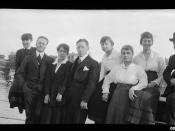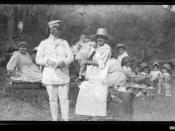Daniel Defoe's Roxana reveals a fall that is much like the fall in Milton's "Paradise Lost." Defoe utilizes images similar to those that appear in Milton's poem which convey a fall from traditional, tangible worship to a materialization of spirituality that occurs in the abstract space of mind. While both Defoe and Milton convey the abstract power of the mind, Defoe departs from Milton by distinguishing the curse of the fall as one of repetition and replication, which attempts to regain a form of paradise through imitation. Defoe conveys the curse of the fall through his protagonist Roxana by linking images of imitation to the mind's process of thought. Thought involves reference back to the past, and repetition of preconceived idea. Defoe contrasts inauthentic repetition of thought with a superlative symbol for originality and creativity. Through contrasting the images that appear in both Defoe and Milton, the repetitive thought with original creativity reveal that the curse of a fallen world is a world that can never regain the original Eden or paradise.
The closest that a fallen world can come to paradis is mere imitation.
Defoe's novel Roxana traces the history and life of a once bourgeoisie woman by the name Roxana. Through the novel Roxana recounts the events which led to the rise and fall that occurred in her life. Defoe begins his novel by providing his readers a brief summary of the events that took place in his heroines life by familiarizing his readers with the initial account which caused Roxana to exit her virtuous and modest world and enter into a world of prostitution and sin.
Roxana choice of a foolish and incompetent led her to finding herself abandoned in a man's world. Lacking the knowledge of how to provide for herself, Roxana dispersed of her...


